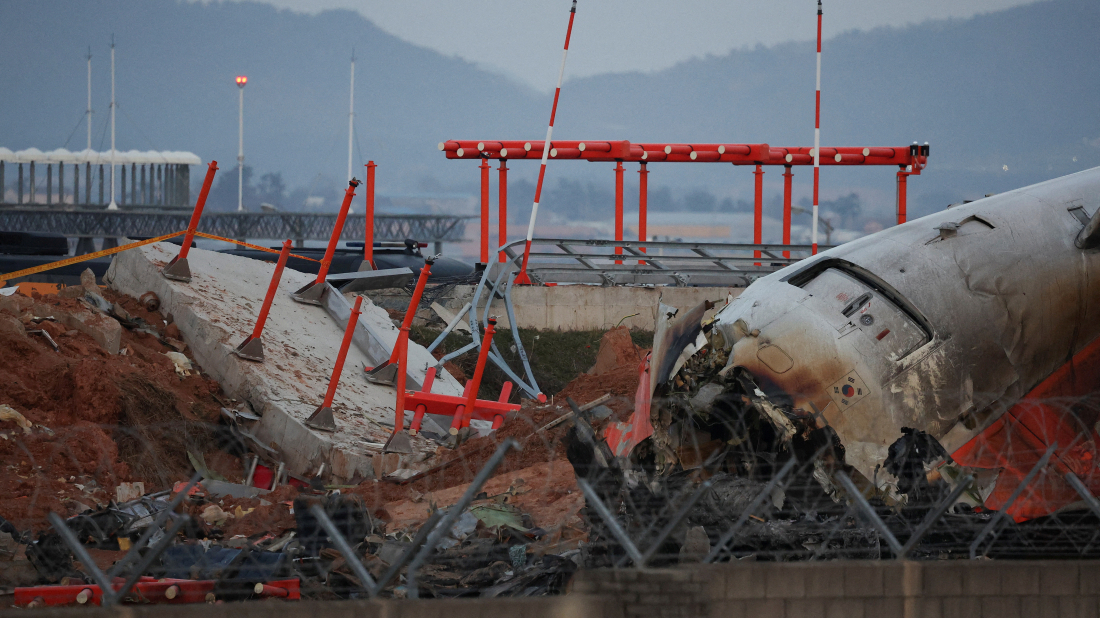Newcastle face Qarabağ FK in UEFA Champions League play-off return
England’s Newcastle United will face Azerbaijan’s Qarabağ FK in the return leg of the UEFA Champions League play-offs....

A Jeju Air crash at South Korea's Muan airport killed 179, with black box data missing. Investigators probe causes, pilot actions, and the embankment's role in the tragedy.
The flight data and cockpit voice recorders on the Jeju Air jet that crashed on Dec. 29 stopped recording about four minutes before the airliner hit a concrete structure at South Korea's Muan airport, the transport ministry said on Saturday.
Authorities investigating the disaster that killed 179 people, the worst on South Korean soil, plan to analyse what caused the "black boxes" to stop recording, the ministry said in a statement.
The voice recorder was initially analysed in South Korea, and, when data was found to be missing, sent to a U.S. National Transportation Safety Board laboratory, the ministry said.
The damaged flight data recorder was taken to the United States for analysis in cooperation with the U.S. safety regulator, the ministry has said.
Jeju Air 7C2216, which departed the Thai capital Bangkok for Muan in southwestern South Korea, belly-landed and overshot the regional airport's runway, exploding into flames after hitting an embankment.
The pilots told air traffic control the aircraft had suffered a bird strike and declared emergency about four minutes before it crashed into the embankment exploding in flames. Two injured crew members, sitting in the tail section, were rescued.
Two minutes before the Mayday emergency call, air traffic control gave caution for "bird activity". Declaring emergency, the pilots abandoned the landing attempt and initiated a go-around.
But instead of making a full go-about, the budget airline's Boeing 737-800 jet took a sharp turn and approached the airport's single runway from the opposite end, crash-landing without landing gear deployed.
Sim Jai-dong, a former transport ministry accident investigator, said the discovery of the missing data from the crucial final minutes was surprising and suggests all power including backup may have been cut, which is rare.
The transport ministry said other data available would be used in the investigation and that it would ensure the probe is transparent and that information is shared with the victims' families.
Some members of the victims' families have said the transport ministry should not be taking the lead in the investigation but that it should involve independent experts including those recommended by the families.
The investigation of the crash has also focussed on the embankment, which was designed to prop up the "localiser" system used to assist aircraft landing, including why it was built with such rigid material and so close to the end of the runway.
Italy said a fond farewell to the Winter Olympics on Sunday with an open-air ceremony in the ancient Verona Arena that celebrated art and sporting achievement at a Games lauded as a model for how to stage such events.
Further Iran-U.S. nuclear talks are scheduled in Geneva on Thursday (26 February) as diplomacy resumes over Tehran’s nuclear programme following earlier mediation efforts. But will the talks move Iran-U.S. negotiations closer to a deal, and what should be expected from the meeting?
The European Parliament’s trade chief has urged a temporary suspension of the EU–U.S. trade agreement approval, citing “tariff chaos” following President Donald Trump’s new 15% tariffs and a U.S. Supreme Court ruling invalidating his previous global tariff programme.
Syria has secured a $50 million financing package from the World Bank to support transport infrastructure projects as the country advances its economic recovery efforts, Syrian media reported on Sunday.
The United Kingdom Defence Secretary John Healey has said he hopes to be the minister who oversees the deployment of British troops to Ukraine, arguing that such a move would signal the end of Russia’s war.
England’s Newcastle United will face Azerbaijan’s Qarabağ FK in the return leg of the UEFA Champions League play-offs.
Laurence des Cars, director of the Louvre Museum, has resigned months after a $102 million daylight heist at the museum, which prompted a parliamentary inquiry.
At least 22 people died and hundreds were displaced in Brazil’s Minas Gerais state on Tuesday (24 February) after relentless, record-breaking rainfall triggered landslides and flash floods.
The military spokesperson for the M23 rebel movement, Willy Ngoma, was killed in an army drone strike in eastern Democratic Republic of Congo early on Tuesday (24 February), according to a regional diplomat, a senior rebel figure and a Western adviser to the government.
Ukraine signalled its readiness for fast-track European Union membership in Kyiv on Tuesday (24 February), as European leaders pledged continued political and financial backing and insisted Russia would gain nothing at the negotiating table.
You can download the AnewZ application from Play Store and the App Store.

What is your opinion on this topic?
Leave the first comment